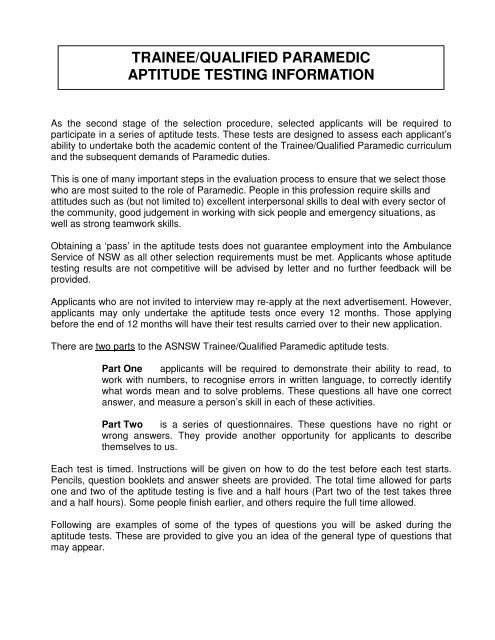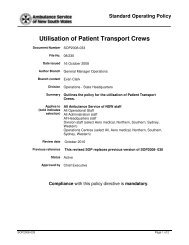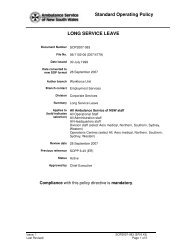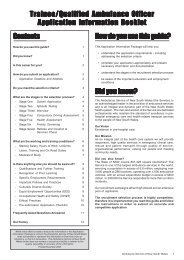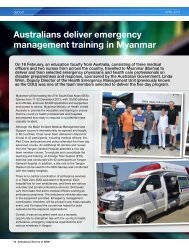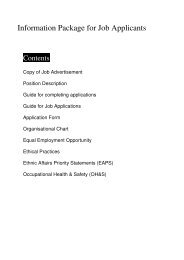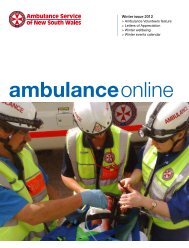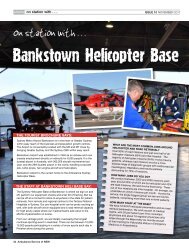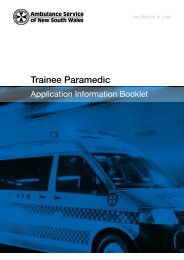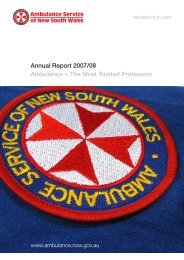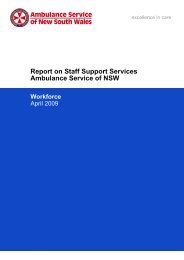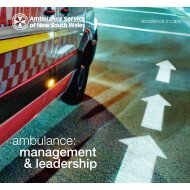trainee/qualified paramedic aptitude testing information - Ambulance ...
trainee/qualified paramedic aptitude testing information - Ambulance ...
trainee/qualified paramedic aptitude testing information - Ambulance ...
You also want an ePaper? Increase the reach of your titles
YUMPU automatically turns print PDFs into web optimized ePapers that Google loves.
TRAINEE/QUALIFIED PARAMEDICAPTITUDE TESTING INFORMATIONAs the second stage of the selection procedure, selected applicants will be required toparticipate in a series of <strong>aptitude</strong> tests. These tests are designed to assess each applicant’sability to undertake both the academic content of the Trainee/Qualified Paramedic curriculumand the subsequent demands of Paramedic duties.This is one of many important steps in the evaluation process to ensure that we select thosewho are most suited to the role of Paramedic. People in this profession require skills andattitudes such as (but not limited to) excellent interpersonal skills to deal with every sector ofthe community, good judgement in working with sick people and emergency situations, aswell as strong teamwork skills.Obtaining a ‘pass’ in the <strong>aptitude</strong> tests does not guarantee employment into the <strong>Ambulance</strong>Service of NSW as all other selection requirements must be met. Applicants whose <strong>aptitude</strong><strong>testing</strong> results are not competitive will be advised by letter and no further feedback will beprovided.Applicants who are not invited to interview may re-apply at the next advertisement. However,applicants may only undertake the <strong>aptitude</strong> tests once every 12 months. Those applyingbefore the end of 12 months will have their test results carried over to their new application.There are two parts to the ASNSW Trainee/Qualified Paramedic <strong>aptitude</strong> tests.Part One applicants will be required to demonstrate their ability to read, towork with numbers, to recognise errors in written language, to correctly identifywhat words mean and to solve problems. These questions all have one correctanswer, and measure a person’s skill in each of these activities.Part Two is a series of questionnaires. These questions have no right orwrong answers. They provide another opportunity for applicants to describethemselves to us.Each test is timed. Instructions will be given on how to do the test before each test starts.Pencils, question booklets and answer sheets are provided. The total time allowed for partsone and two of the <strong>aptitude</strong> <strong>testing</strong> is five and a half hours (Part two of the test takes threeand a half hours). Some people finish earlier, and others require the full time allowed.Following are examples of some of the types of questions you will be asked during the<strong>aptitude</strong> tests. These are provided to give you an idea of the general type of questions thatmay appear.
PART ONE - ABILITY QUESTIONSReading and Comprehension ExampleEthics in Health Care (passage taken from Mosby’s Paramedic Textbook, pages 96-97)The fundamental question of ethical tests in health care is, “What is in the patient’s best interest?”However, doing what is best, or what one thinks is best, is not sufficient to justify actions. Determiningwhat the patient wants must first be defined by patient statements (if the patient is mentallycompetent), written statements, and family input (if the patient demonstrates altered mental status orincompetence). The role of “good faith” in making ethical decisions (“Am I doing my best to help andnot harm my patient?”) should be balanced with the wishes of the patient and the patient’s family. Theglobal concept of health care (providing patient benefit and avoiding harm) recognises and respectsthe patient’s autonomy, as well as the various legal issues that affect the delivery of health care.An otherwise young and healthy person is treated for minor cuts and bruises at thescene of a motor vehicle accident. As you treat the patient, he confesses that he isdepressed and asks you for a potentially lethal dose of medication. How, and underwhat ethical basis, should you act?A. Refuse the request (“Am I doing my best to help and not harm thepatient?”)B. Refuse the request (“What is in the patient’s best interest?”)C. Refuse the request (on both bases stated in A and B)D. Grant the request (Respecting the rights and autonomy of the patient)Numeracy Question ExamplesFor each of the following questions, choose the correct answer. There is only one correctanswer.1. 19 + 11 = ?A. 27B. 8C. 30D. 31The correct answer = (C) 302. 14 – 6 = ?A. 7B. 8C. 9D. 10The correct answer = (B) 8
3. An ambulance receives an emergency call. The location of the victim is exactly 5kilometres from where the ambulance is now. Assuming that the ambulance travelsthe whole distance at exactly 60 kilometres per hour, how long will it take to arriveat the scene?A. 5 minutesB. 6 minutesC. 10 minutesD. 12 minutesThe correct answer = (A) 5 minutes.If the ambulance can travel 60 kilometres in 60 minutes, it is travelling at 1 kilometre perminute. Therefore, to travel 5 kilometres at 60 kilometres per hour will take 5 minutes.Written LanguageIn each group of sentences listed below, choose the one that is most correct.Example 1.A. The oficer approached the scene.B. The officer aproached the scene.C. The officer approached the scene.D. The officer approached the seen.The correct answer = (C)All of the other choices have a spelling mistake.Example 2.A. The vehicle made a left turn.B. The vehicle made a Left turn.C. The vehicle, took a left turn.D. The vehicle took a left Turn.The correct answer = (A).All of the other choices either have a comma in the wrong place, or have a letter that iscapitalised incorrectly.
Word MeaningsIn the sample items below, the first word in each line is printed in capital letters.Opposite it are four other words. You will be asked to circle the one word whichmeans the same thing, or most nearly the same thing, as the first word.1. HOUSE shed garden home garage2. SIMPLE easy sample little clear3. OPTIMISTIC bright hopeful characteristic carefulANSWERS:1. = home2. = easy3. = hopefulThere will also be questions where you are asked to fill in either a letter or number foreach space (___) which follows the <strong>information</strong> you are given.EXAMPLE:1. 1 3 5 7 __2. good bad down __ __3. 1 2 3 4 5 2 3 4 5 1 3 4 5 6 7 4 5 6 7 3 5 6 7 8 9 6 7 8 9 __ANSWERS:1. 92. up3. 5 explanation: in the second set of numbers the first number has been moved to the lastplace followed by five more numbers which are in order. In the fourth set of numbers the firstnumber has been moved to the last place, this is followed by another set of numbers insequence. The correct answer is 5 as it follows the pattern of taking the first number in thesequence and placing it at the end.
PART TWO – QUESTIONNAIRESPREFERENCESHere you will be given two statements that will be about things that you may or maynot like, or about ways in which you may or may not feel. You will be asked to make achoice for every pair of statements. For example:A. I like to be involved in outdoor activities.B. I enjoy reading books and magazines.To answer this you need to consider which of these is more characteristic of what you like.You may like both. In this case you should choose the one that you like better. You maydislike both. In this case you should choose the one that you dislike less.Here is another example:A. I feel pleased when I have a chance to work with other people.B. I feel discouraged when I’m unable to solve a difficult problem.You will be asked to choose which of these is most like the way that you feel now. Again,both may describe the way you feel. Your job will be to select the one which is most like you.If neither describes how you feel, choose the one which you consider is most like you.OPINIONS ABOUT SOCIETYHere you will be given two statements about aspects of life in our society. You will beasked to choose the one which you more strongly believe. For example:A. People tend to get ahead in life because they know the right people.B. People tend to be successful because of pure hard work.If you agree with both sentences, you will be asked to choose the one that you believe morestrongly. If you don’t agree with either sentence, you will be asked to choose the one that youdisagree with least.
WORKPLACE PROCEDURESHere you will be given some statements about what goes on in many work places.You’ll be asked to indicate whether you agree, disagree or feel uncertain about thestatement. Examples:A = agree ? = uncertain DA = disagree1. Most people require close supervision at work A ? DA2. A good boss is someone who can understand how you feelabout a problem. A ? DAYOUR PERSONAL HISTORY AND OPINIONHere you will be given a series of statements. You will be asked to indicate whetherthe statement is True or False as it applies to you.For example:1. Most of the time I have a good sense of humour. T F2. I often find it hard to wake up in the morning. T F3. Sometimes I find that little things irritate me more than most otherpeople. T F4. I believe that people who are basically honest are most likely to getahead in this world. T F


